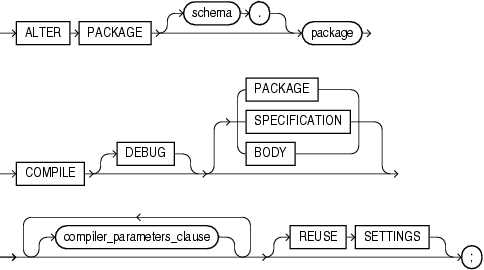| Oracle® Database PL/SQL Language Reference 11g Release 2 (11.2) Part Number E10472-02 |
|
|
View PDF |
| Oracle® Database PL/SQL Language Reference 11g Release 2 (11.2) Part Number E10472-02 |
|
|
View PDF |
The ALTER PACKAGE statement explicitly recompiles a package specification, body, or both. Explicit recompilation eliminates the need for implicit run-time recompilation and prevents associated run-time compilation errors and performance overhead.
Because all objects in a package are stored as a unit, the ALTER PACKAGE statement recompiles all package objects together. You cannot use the ALTER PROCEDURE statement or ALTER FUNCTION statement to recompile individually a procedure or function that is part of a package.
Note:
This statement does not change the declaration or definition of an existing package. To redeclare or redefine a package, use the "CREATE PACKAGE Statement", or the "CREATE PACKAGE BODY Statement" with theOR REPLACE clause.Topics:
Prerequisites
If the package is in the SYS schema, you must be connected as SYSDBA. Otherwise, the package must be in your own schema or you must have ALTER ANY PROCEDURE system privilege.
Syntax
alter_package::=

compiler_parameters_clause::=
Semantics
schema
The name of the schema containing the package. The default is your own schema.
package
The name of the package to be recompiled.
COMPILE
Recompiles the package specification or body.
During recompilation, the database drops all persistent compiler switch settings, retrieves them again from the session, and stores them after compilation. To avoid this process, specify the REUSE SETTINGS clause.
See Also:
"Recompiling a Package: Examples"SPECIFICATION
Recompiles only the package specification, whether it is valid or invalid. You might want to recompile a package specification to check for compilation errors after modifying the specification.
When you recompile a package specification, the database invalidates any local objects that depend on the specification, such as procedures that call procedures or functions in the package. The body of a package also depends on its specification. If you subsequently reference one of these dependent objects without first explicitly recompiling it, then the database recompiles it implicitly at run time.
BODY
Recompiles only the package body, whether it is valid or invalid. You might want to recompile a package body after modifying it. Recompiling a package body does not invalidate objects that depend upon the package specification.
When you recompile a package body, the database first recompiles the objects on which the body depends, if any of those objects are invalid. If the database recompiles the body successfully, then the body becomes valid.
PACKAGE
Recompiles both the package specification and (if it exists) the package body, whether they are valid or invalid. This is the default. The recompilation of the package specification and body lead to the invalidation and recompilation of dependent objects as described for SPECIFICATION and BODY.
compiler_parameters_clause
Has the same behavior for a package as it does for a function. See the ALTER FUNCTION compiler_parameters_clause.
REUSE SETTINGS
Has the same behavior for a package as it does for a function. See REUSE SETTINGS.
Examples
Recompiling a Package: Examples This statement explicitly recompiles the specification and body of the hr.emp_mgmt package. See "Creating a Package: Example" for the example that creates this package.
ALTER PACKAGE emp_mgmt COMPILE PACKAGE;
If the database encounters no compilation errors while recompiling the emp_mgmt specification and body, then emp_mgmt becomes valid. The user hr can subsequently call or reference all package objects declared in the specification of emp_mgmt without run-time recompilation. If recompiling emp_mgmt results in compilation errors, then the database returns an error and emp_mgmt remains invalid.
The database also invalidates all objects that depend upon emp_mgmt. If you subsequently reference one of these objects without explicitly recompiling it first, then the database recompiles it implicitly at run time.
To recompile the body of the emp_mgmt package in the schema hr, issue this statement:
ALTER PACKAGE hr.emp_mgmt COMPILE BODY;
If the database encounters no compilation errors while recompiling the package body, then the body becomes valid. The user hr can subsequently call or reference all package objects declared in the specification of emp_mgmt without run-time recompilation. If recompiling the body results in compilation errors, then the database returns an error message and the body remains invalid.
Because this statement recompiles the body and not the specification of emp_mgmt, the database does not invalidate dependent objects.
Related Topics